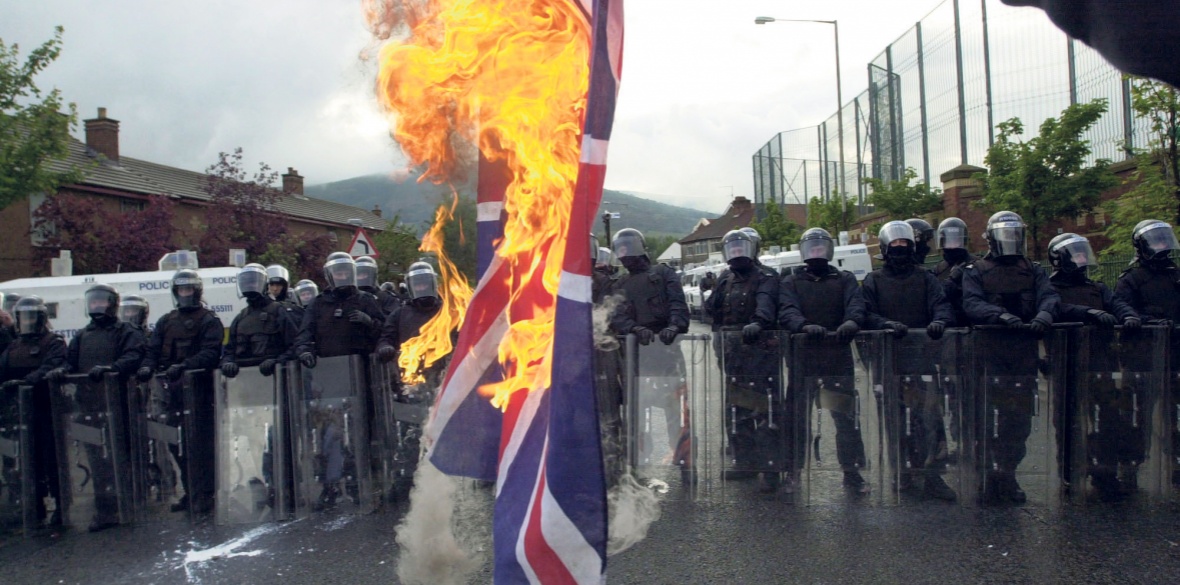This is the last article you can read this month
You can read more article this month
You can read more articles this month
Sorry your limit is up for this month
Reset on:
Please help support the Morning Star by subscribing here
SOMETHING strange occurred in the spring of 2017. An election was held. The parliamentary arithmetic aligned in an unprecedented fashion. And lots of people in England were rudely awakened to the fact that we continue to maintain a colony in Ireland.
Don’t get me wrong. I sympathised with people, especially women, who felt fearful about the prospect of ultra-reactionary Ulster Loyalists holding the balance of power in Parliament. But a part of me was a bit like “seriously libs, have you only just noticed these numpties?”
For whilst the degree of Loyalist power at Westminster was a novelty, the people of the Six Counties have, for many long years, been subjected to the moral and political bellenditude of the Democratic Unionist Party and similar political forces.
Since then, the reminders that the colony exists have been coming in thick and fast. This is partly down to Brexit. The most recent version of the Six-County system, the Good Friday Agreement, was underpinned by the presumption that the economic policies of Britain and Ireland would be permanently aligned by the extra-democratic power of the European Union, thereby enabling frictionless trade.
The presumption has turned out to be quite silly and many an apple-cart has now been upset. To understand the friction that has emerged between the Ulster Loyalists and the British state, it is worth perusing some of the old videos of Ian Paisley (a guilty pleasure for those of us who enjoy tasty demagoguery).
At one Troubles-era demonstration, he outlines his grievances about the situation in the North and crescendos with the assertion that “nowhere else in Britain would this be tolerated.”
This is a useful signifier, both of the fate that befalls boys who bunk off geography in order to go to church and also of Ulster Unionist resentment towards the metropolitan ruling class.
To go to the North of Ireland and to see the many less-than-salubrious neighbourhoods that are decked out in Union Jacks is to be reminded that loyalty to her majesty is something of a one-way street.
The public housing, on which Unionists once enjoyed first dibs, has now largely been sold off and the better paying manufacturing jobs to which they enjoyed relatively favourable access have now largely disappeared.
From this perspective, the customs checks are taken as a provocation, not simply because of what they signify about Ulster’s detachment from the UK, but because of what they confirm about Ulster’s semi-subordinate place within the British system.
As things stand, despite Brexit going through on paper, the can has very much been kicked down the road with regard to the ultimate impact on the Six Counties.
Somewhat more pressingly, Sinn Fein are now the most popular party on both sides of the border. The Irish political oligarchy are doing their very best to keep them out of office. Yet given ongoing political trends, the structural dysfunctionality of the Stormont system and the questions raised by Brexit, it is difficult to see how the border issue can be kept from coming to the fore.
In this context, British socialists have a role to play in making the argument for a united Ireland.
Whereas the Johnson government has responded to Sinn Fein’s victory with Unionist muscle-flexing — in the shape of Boris Johnson reiterating his bellendulous proposal to build a bridge across the Irish sea — we on the British left have the opportunity to push in the opposite direction.
In some ways the case for a united Ireland has never been easier to make in England. Aside from a few weirdos in the north-west, grassroots English unionism is now largely a thing of the past. If you were to exclaim to the average denizen of London that “Home Rule is Rome Rule!” they would probably look at you with a significant degree of incomprehension.
What’s more, two years of having Arlene Foster on our screens is enough to make a fair few people wonder whether we want this sort of force to be part of our polity. With that said, we do still need to get across that the DUP does not arise from some of kind peculiar provincial backwardness, but is instead the sort of political force that is sustained by a polity that was built upon the principle of confessional division.
Raising the demand for a united Ireland will also offer us the opportunity to say something different about the country we live in over on this side of the sea.
The dominant forces of Leave and Remain both articulated aspirations of making Britain great — whether it was through cartelising with other former great powers, or restoring some mirage of some great, commercial seafaring nation.
It is time that a voice was given to those of us who would like England, Scotland and Wales to become more marginal to world affairs. Many of us believe that our national existence, insofar as it must be a thing, should be defined by something other than how much power we project into the world.
And solidarity with those people in Ireland who want to bring the 800-year occupation of their country to an end would be a great starting point for making this perspective heard.











